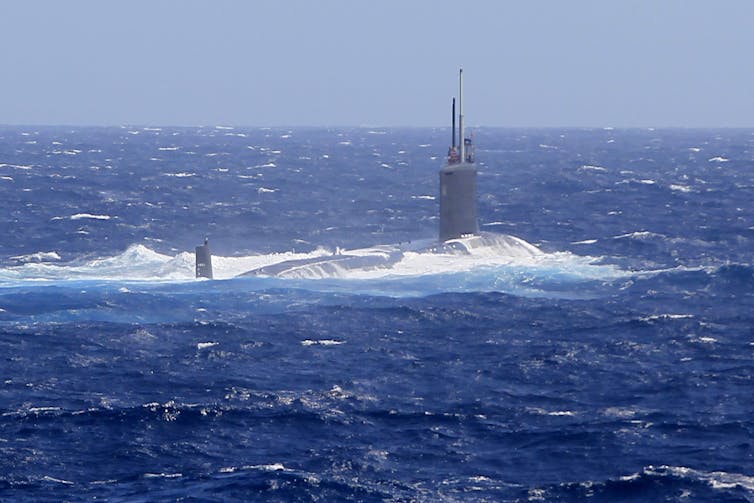Quantum technology, which makes use of the surprising and infrequently counterintuitive properties of the subatomic universe, is revolutionising the best way information is gathered, stored, shared and analysed.
The industrial and scientific potential of the quantum revolution is vast, however it is in national security that quantum technology is making the largest waves. National governments are by far the heaviest investors in quantum research and development.
Quantum technology guarantees breakthroughs in weapons, communications, sensing and computing technology that might change the world’s balance of military power. The potential for strategic advantage has spurred a significant increase in funding and research and development in recent times.
The three key areas of quantum technology are computing, communications and sensing. Particularly within the United States and China, all three at the moment are seen as crucial parts of the struggle for economic and military supremacy.
The race is on
Developing quantum technology isn’t low cost. Only a small variety of states have the organisational capability and technological know-how to compete.
Russia, India, Japan, the European Union and Australia have established significant quantum research and development programs. But China and the US hold a considerable lead in the brand new quantum race.
And the race is heating up. In 2015 the US was the world’s largest investor in quantum technology, having spent around US$500 million dollars. By 2021 this investment had grown to almost US$2.1 billion.
However, Chinese investment in quantum technology in the identical period expanded from US$300 million to an estimated US$13 billion.
Susan Walsh / AP
The leaders of the 2 nations, Joe Biden and Xi Jinping, have each emphasised the importance of quantum technology as a critical national security tool in recent times.
The US federal government has established a “three pillars model” of quantum research, under which federal investment is split between civilian, defence and intelligence agencies.
In China, information on quantum security programs is more opaque, however the People’s Liberation Army is thought to be supporting quantum research through its own military science academies in addition to extensive funding programs into the broader scientific community.
Artificial intelligence and machine learning
Advances in quantum computing could lead to a leap in artificial intelligence and machine learning.
This could improve the performance of lethal autonomous weapons systems (which might select and have interaction targets without human oversight). It would also make it easier to analyse the massive data sets utilized in defence intelligence and cyber security.
Improved machine learning might also confer a significant advantage in carrying out (and defending against) cyber attacks on each civilian and military infrastructure.
The strongest current quantum computer (so far as we all know) is made by the US company IBM, which works closely with US defence and intelligence.
Unhackable communication
Quantum communication systems may be completely secure and unhackable. Quantum communication can also be required for networking quantum computers, which is anticipated to boost quantum computational power exponentially.
China is the clear global leader here. A quantum communication network using ground and satellite connections already links Beijing, Shanghai, Jinan and Heifei.
China’s prioritisation of secure quantum communications is probably going linked to revelations of US covert global surveillance operations. The US has been by far essentially the most advanced and effective communications, surveillance and intelligence power for the past 70 years – but that might change with a successful Chinese effort.
More powerful sensors
Quantum computing and communications hold out the promise of future advantage, however the quantum technology closest to military deployment today is quantum sensing.
New quantum sensing systems offer more sensitive detection and measurement of the physical environment. Existing stealth systems, including the newest generation of warplanes and ultra-quiet nuclear submarines, may now not be so hard to identify.
Superconducting quantum interference devices (or SQUIDs), which might make extremely sensitive measurements of magnetic fields, are expected to make it easier to detect submarines underwater within the near future.

Ricardo Maldonado Rozo / EPA
At present, undetectable submarines armed with nuclear missiles are thought to be an important deterrent against nuclear war because they may survive an attack on their home country and retaliate against the attacker. Networks of more advanced SQUIDs could make these submarines more detectable (and vulnerable) in the longer term, upsetting the balance of nuclear deterrence and the logic of mutually assured destruction.
New technologies, latest arrangements
The US is integrating quantum cooperation agreements into existing alliances reminiscent of NATO, in addition to into more moderen strategic arrangements reminiscent of the Australia–UK–US AUKUS security pact and the Quadrilateral Security Dialogue (“the Quad”) between Australia, India, Japan, and the US.
China already cooperates with Russia in lots of areas of technology, and events might propel closer quantum cooperation.
In the Cold War between the US and the USSR, nuclear weapons were the transformative technology. International standards and agreements were developed to control them and ensure some measure of safety and predictability.
In much the identical way, latest accords and arrangements shall be needed because the quantum arms race heats up.
This article was originally published at theconversation.com





